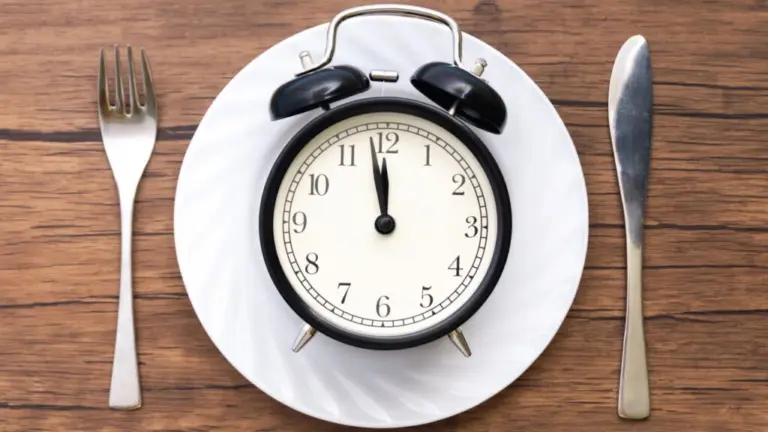Hey guys! Have you ever thought about getting into the world of intermittent fasting, but still have doubts, right? “Does it really work?” “Will it make me weaker?” “Will I starve to death?” If you’ve ever asked yourself any of these questions, don’t worry, you’re not alone.
I've been there too. In fact, I'm someone who's been experimenting with intermittent fasting for quite some time, and today I want to share with you everything I've learned.
Let's dispel the myths and clarify the truth about this practice that is all the rage!
Intermittent Fasting: What Is It Really?
First, let me explain the basics. Intermittent fasting is not a diet, it’s more of a way of organizing the periods in which you eat and do not eat.
It's basically dividing your day into cycles of eating and fasting. No crazy restrictions or impossible diets.
The idea is to give your body time to rest from the digestive process and focus on other processes, such as burning fat and cell regeneration.
I've heard all sorts of things about intermittent fasting, so I decided to write this article to share what really works. I'll tell you the biggest myths and the truths you need to know so you don't fall into the trap.
Myth 1: “Intermittent fasting will leave you weak and without energy”
When I started, many people told me that I would lose energy, become weak and even irritable. But, on the contrary, what happened was exactly the opposite. At first, I thought it would be difficult, but my body adapted really well.
The truth is that when you practice intermittent fasting correctly, your body starts using fat as an energy source. This means that instead of relying on food every hour, you will have more energy throughout the day, since fat starts to be burned more efficiently.
Myth 2: “Intermittent fasting is only for those who want to lose weight”
Another classic myth. Anyone who knows me knows that I'm not the type to go on any crazy diet just because I want to lose weight.
When I started intermittent fasting, my focus wasn't on losing weight, but on improving my health and feeling more energetic. Sure, I ended up losing a few pounds, but that's not the main thing.
Intermittent fasting has several benefits beyond weight loss. It can improve insulin sensitivity, reduce inflammation, and even increase longevity, as some studies suggest.
So, if you're thinking it's just about losing weight, it's time to open your mind!
Myth 3: “Intermittent fasting will make you eat more at one meal and gain weight”
This is a fear that many people have. They think that since they will go a while without eating, they will compensate and eat a lot when it is time to eat.
I was also scared at first, but I soon realized that intermittent fasting doesn't force you to eat more.
On the contrary, as you have a longer interval between meals, you tend to be more satisfied with less food.
I began to understand my appetite better. Instead of eating on impulse or snacking all day, I felt like I was actually eating because my body was asking me to.
And yes, I even said goodbye to unnecessary snacking between meals!
Myth 4: “Intermittent fasting is only for those who have discipline”
I also thought that I would need to be a monk, with a brutal level of discipline, to be able to follow intermittent fasting.
But in reality, it's not quite like that. Sure, it might be harder at first, but after a while, your body will adapt and you'll feel super relaxed.
The most important part is to listen to your body. There’s no point in forcing yourself to follow a protocol that doesn’t work for you.
I, for example, started with a 16-hour fast and ate in an 8-hour window.
At first, I even found myself thinking, “Will it work?”, but over time, I realized that the secret was finding the balance that works for you. You don’t have to be 100% perfect all the time.
Truth 1: “Intermittent Fasting Improves Brain Health”
This is no idle talk. And it is one of the biggest benefits I felt right from the start. Studies show that intermittent fasting can improve brain health, help in the production of new neurons and even increase memory and mental clarity. I felt this right away!
When you practice intermittent fasting, your body enters a state of cellular regeneration, and this directly affects brain health.
And, let me tell you, I felt a difference in concentration and focus, especially at work. Now, with a sharp brain, any task seemed easier to perform.
Truth 2: “Intermittent fasting can help prevent disease”
Here comes one of the aspects that convinced me most to follow this practice.
Intermittent fasting has shown benefits in several studies, such as reducing the risk of chronic diseases, such as type 2 diabetes, heart disease and even some types of cancer.
I know, it sounds like science fiction, but science is actually starting to support this idea.
This type of fasting activates cellular repair processes, reduces oxidative stress, and even helps control inflammation. And when I started noticing all these benefits, I thought, “It was totally worth it.”
Truth 3: “Intermittent fasting can be flexible and adapted to your lifestyle”
And finally, one of the best things about intermittent fasting is its flexibility. As I mentioned, you don’t have to be a disciplined monk to practice it.
You can adapt it according to your routine. Some people fast for 12 hours, others do 24 hours once a week, or even the 16/8 strategy (16 hours of fasting and 8 hours to eat).
I started with the 16/8 model, which I found to be the easiest to fit into my routine, but the cool thing is that you can adjust it to whatever works for you. The key is to not overdo it and respect your body.
Fasting Strategies: How to Improve Your Health and Performance with Intermittent Fasting
news
Extra Tip: Listen to your body and be patient!
In the end, the intermittent fasting It's a lot about patience and actively listening to your body. There's no point in trying to follow exactly what everyone else says if it doesn't make sense to you.
And most importantly, don't rush. Remember that results come with time, and there are no magic formulas.
It took me a while to fully adapt, but today, I can say that my body is in a rhythm that really works.
Additionally, I feel like over time I have gained more energy and health in ways I never imagined.
So, are you up for trying intermittent fasting and seeing what happens? If you have any questions or need more specific advice, just contact me. Let’s join us on this journey to health and well-being!




